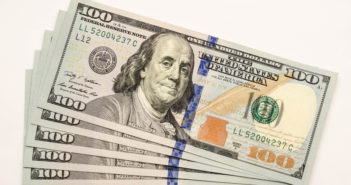For as long as just about anyone can remember, the US dollar has been the King of Currencies. American pre-eminence in global economic and political affairs and its unchallenged role as the Leader of the Free World have largely been responsible for the greenback’s standing as the global reserve currency. However, with incremental changes in the world order, might the US dollar be toppled from pole position?
With the growth of the “global village”, America has recognized that its overall share of the total world economy has been slipping. Challenged by Japan and China in the Far East, and by a more-or-less united Europe, large trading blocs have grabbed themselves their own chunk of the global economic pie. This trend has been further enhanced by President Trump’s stated goal of building America for the Americans, thus further isolating the US as a global world player. However, the US dollar is still considered as the world’s number one currency of choice. Currently, the US dollar comprises about two thirds of international debt, and a similar quantity of global reserve holdings. Oil, Gold, and the majority of international commodities are also priced in US dollars. Yes, the greenback is still king of the currency castle.
Now, leaders of global economic groups are finding the courage to make a stand. Jean-Claude Juncker, the current president of the European Commission, called it “absurd” that European countries should be purchasing European goods such as aircraft in US dollars, and he is probably correct. China’s President Xi Jinping has also stepped up to promote his own country’s currency by launching a Chinese yuan-denominated oil futures contract. Russia has followed suit by cutting its own US dollar holdings, stating that the US currency presented too much of a risk to hold.
However, the US dollar still manages to retain a semi-mystical value, as international investors flood into that currency during times of political or economic uncertainty. This is the case even when the US itself is the source of the instability, such as with the 2008 sub-prime rate banking crisis.
But don’t think that the current international moves are worrying the United States. Any damaging moves will take years, if not decades to change the status-quo. The real reason for this is the weakness of the political will of such organizations as the European Commission, or other political-economic bodies such as OPEC. One example of this lack of political backbone is the imminent financial sanctions on countries that trade with Iran. Many countries will abide by the sanctions rather than run the risk of falling foul of powerful US offices such as the Office of Foreign Assets Control. The US sees blocs like the European Union as “strong on rhetoric and weak on follow-through”, in the words of US National Security Advisor John Bolton.
The key issue is that the world outside the US pays 100 cents for each US dollar, which only cost America 1-2 cents to produce. This position continues to maintain American dominance of the world economic order. Until non-US economic forces align to challenge America’s financial currency status, America will maintain its global economic hegemony.
Get the 5 most predictable currency pairs
What Makes the Dollar Retain Its Dominance?
